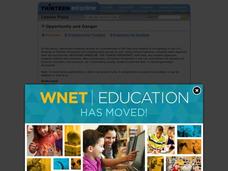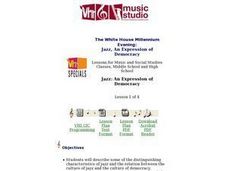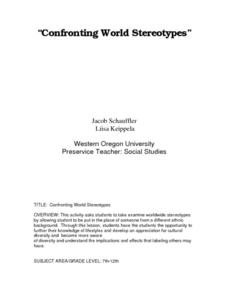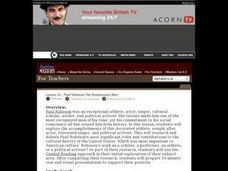Curated OER
Just an Environment or a Just Environment?
This instructional activity explores the multiple causes of racial segregation and environmental racism, and helps students understand the perpetuation of institutional racism in the post-Civil Rights era. Students will perform a mock...
Curated OER
The Growth of the Suburbs - and the Racial Wealth Gap
This lesson explores structural racism by revealing the important role that family wealth plays in shaping life chances how opportunities to accumulate wealth have been racialized, and the roots and consequences of the current race-based...
Curated OER
United Nations International Declaration of Human Rights (1947) - 12 October 2000
Students use the 1947 Declaration of Human Rights to explore the concept of basic human rights in relation to past and present world situations. They brainstorm or think of cases where rights are being abused at school, in Australia or...
Curated OER
Warlugulong
Learners explore and appreciate variety of ways in which environment can be depicted for range of purposes. They compare different representations of place and environment, and analyze ways information is being communicated.
Curated OER
Grass roots human rights
Students examine Professor Lowitja O'Donoghue's Ten Point Plan for Human Rights Action. They consider what initiatives they, as a group or as individuals, can take. Students analyze which human rights issues in Australia that they feel...
Curated OER
Fair Dinkum!
Students define fairenss, justice and equity as they are known to them. In groups, they role-play varoius scenerios and discuss their reactions to it. As a class, they share experiences in which they were treated unfairly and what could...
Curated OER
International Human Rights Day
Young scholars read the plain language version of the Universal Declaration of Human Rights and consider its relevance today. They discuss the following questions: How does the Universal Declaration of Human Rights apply to your own...
Curated OER
Perceptions - Accuracy
Pupils recognise the link between the accuracy of their perception of another person and their knowledge of that person. They partner with each other and make one list of five things (television programs, school subjects, leisure...
Curated OER
Opportunity and Danger
Students examine the Immigration Acts of 1862 and 1865. They discover how Chinese immigrants faced prejudice. They interview a first or second generation immigrant.
Curated OER
STRATEGIES FOR A SUCCESSFUL WORLD
Young scholars explore how to overcome stereotypes and gender bias.
Curated OER
Changing Perspectives on the Japanese Internment Experiment
Students discover the characteristics of Japanese internment during World War II. They discuss racist policies and use the internet to gather information to write their own version of history. They write essays from different points of...
Curated OER
Jazz: An Expression of Democracy
Students watch a video segment about the distinguishing characteristics of jazz. They describe those characteristics and the relation between the culture of jazz and democracy. They improvise simple rhythms and melodies.
Curated OER
Confronting World Stereotypes
Students examine pervasive worldwide stereotypes through role play. They are placed in the role of someone from a different ethnic background. After interacting with groups of students in their new role, stereotyped students write a...
Curated OER
Mandela The Man
Ninth graders explore civil rights by reading several biographies. In this Nelson Mandela lesson, 9th graders discuss the trials and tribulations Nelson Mandela had to face in South Africa and how they were similar to the problems Martin...
Curated OER
Martin Luther King Jr. Who Is He?
Young scholars describe MLk's leadership of the desegregation movement. Students discuss the meaning of non-violent revolution. Young scholars identify the difference between their lives and those ofcitizens in 1963. Students write a...
Curated OER
Paul Robeson: The Renaissance Man
Students research the life of athlete, actor, singer, cultural scholar, author, and political activist, Paul Robeson. They answer the question, "Which was most important to American culture -Robeson's work as a scholar, a performer, an...
Curated OER
Change: Just a Matter of Time
Students analyze the Declaration of Independence and primary sources to explain civil rights. Then, students write a Declaration of Change to express the grievances of African Americans, and their desire to participate fully in the...
Curated OER
The Sidney Poitier High School
Students research the life of Sidney Poitier and plan an hour-long dedication ceremony for a school that has just been renamed after him.
Curated OER
Researching Hate Crimes: Who and Why?
Students research contemporary information on hate crimes and on legislation designed to curtail and control such activity. They discuss the distinctive nature of hate crimes as opposed to other types of violent crimes. Students work...
Curated OER
Episode # 158A
Students research the life of Martin Luther King, Jr. and determine how they can contribute to community projects.
Curated OER
Court Documents Related to
Young scholars use the National Archives to researcj cout coduments related to Martin Luther King, Jr.
Curated OER
Fight for Freedom
Students research examples of slavery in the world today, and explore some ways they can help current slaves gain their freedom. After students develop a plan for helping to fight slavery, they take action.
Curated OER
Re-Examining Brown
Students identify, research, and report on the people, legal cases and conditions that led to the landmark case, Brown v. Board of Education. They role-play various people from the era preceding 1954.
Curated OER
Frantz Fanon: Black Skin, White Mask
Students examine the history and geography of Martinique and Algeria, with an emphasis on broader issues of race and colonialism. They list some reasons that violence is or isn't a legitimate force in the struggle for people's freedom.

























